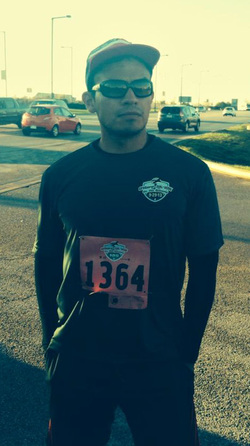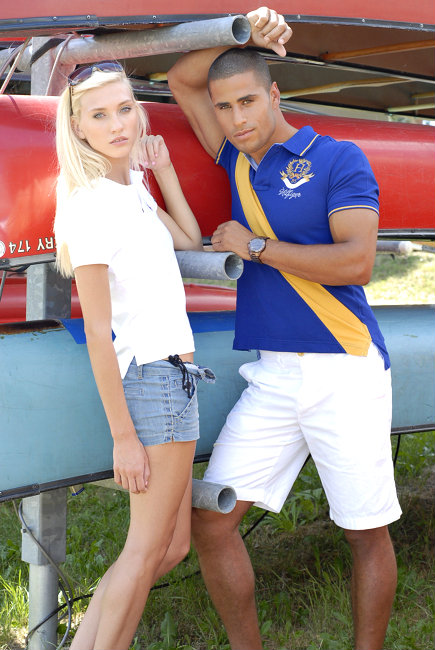By Jorge G. Zavala | Creative Director
Whether you have taken up running to lose weight, to improve fitness, to relieve stress, to compete, or just to kill time, you'll find that the benefits are many.
No doubt you're looking for "the best way" to run, and we can point you in the right direction. Keep in mind, though, that there are few universal truths to running. Everything depends on the individual, and techniques that some runners swear by might not be right for you. As the Chicago Marathon 2013 nears (October 13th), I've compiled my best tips from years of running that may be of benefit to your running endeavors.
FOOD/NUTRITION
*For long races or runs, take half a gel pack 30 minutes into the race and then continue that pattern every 30 minutes to the end: consistency in race nutrition is key. If you wait to eat when you’re hungry, your fuel levels are already too low and you will hit the proverbial wall too soon.
*“Carb-loading” the night before a race really isn’t necessary and, in fact, has been proven somewhat ineffective, especially for women. In lieu of that, eat a healthy dinner and then a solid breakfast, including a good fat (eg, nut butter), protein and good carbs (eg, brown rice or sweet potato).
*I get asked a lot what to eat before a run. The answer is that everyone is different. Some people cannot digest a big meal too close to a run, so I recommend a small handful of almonds, which oddly tend to agree with a finicky stomach (probably because fat slows down digestion for a slower burn). If you need more fuel, try the good carb-good fat-protein combo, eating, for example, a whole-wheat English muffin with almond butter and banana.
*Recovery eating is more of the same thing: within 45 minutes of a tough run or race, eat a small meal consisting of good fat, protein and good carbs. It’s a necessity to replenish your energy stores and build muscle.
HYDRATION
*Hydration is probably the biggest factor in performance out on the road or trail and in fitness in general. Everyone needs to be drinking tons of water every day, especially in the summer when we dehydrate that much faster. Mix in a post-run Gatorade or coconut water for some added electrolyte action.
*A secret for re-hydration: watermelon! Bonus is that it is a delicious post-run snack, particularly in warmer weather. Add in a handful of almonds for your protein and good fat.
Whether you have taken up running to lose weight, to improve fitness, to relieve stress, to compete, or just to kill time, you'll find that the benefits are many.
No doubt you're looking for "the best way" to run, and we can point you in the right direction. Keep in mind, though, that there are few universal truths to running. Everything depends on the individual, and techniques that some runners swear by might not be right for you. As the Chicago Marathon 2013 nears (October 13th), I've compiled my best tips from years of running that may be of benefit to your running endeavors.
FOOD/NUTRITION
*For long races or runs, take half a gel pack 30 minutes into the race and then continue that pattern every 30 minutes to the end: consistency in race nutrition is key. If you wait to eat when you’re hungry, your fuel levels are already too low and you will hit the proverbial wall too soon.
*“Carb-loading” the night before a race really isn’t necessary and, in fact, has been proven somewhat ineffective, especially for women. In lieu of that, eat a healthy dinner and then a solid breakfast, including a good fat (eg, nut butter), protein and good carbs (eg, brown rice or sweet potato).
*I get asked a lot what to eat before a run. The answer is that everyone is different. Some people cannot digest a big meal too close to a run, so I recommend a small handful of almonds, which oddly tend to agree with a finicky stomach (probably because fat slows down digestion for a slower burn). If you need more fuel, try the good carb-good fat-protein combo, eating, for example, a whole-wheat English muffin with almond butter and banana.
*Recovery eating is more of the same thing: within 45 minutes of a tough run or race, eat a small meal consisting of good fat, protein and good carbs. It’s a necessity to replenish your energy stores and build muscle.
HYDRATION
*Hydration is probably the biggest factor in performance out on the road or trail and in fitness in general. Everyone needs to be drinking tons of water every day, especially in the summer when we dehydrate that much faster. Mix in a post-run Gatorade or coconut water for some added electrolyte action.
*A secret for re-hydration: watermelon! Bonus is that it is a delicious post-run snack, particularly in warmer weather. Add in a handful of almonds for your protein and good fat.
TRAINING
*Contrary to popular opinion, actually running 5-7 days a week while in training is not a good idea for almost anyone. Do a longer run, a shorter run and a “workout” day (eg, hills or speed) and then mix in strength (do not be afraid to lift—it will make your endurance go through the roof!) and cross training.
*When you get to a big hill, don’t panic! This too shall pass. To make it easier, shorten your stride considerably, and make quicker, choppier steps, pumping your arms (but relax those shoulders) to help propel you up and over. Don’t forget to “pop the top”—in other words, don’t slow down and start dragging your feet when the top is in sight. Continue powerfully over the hill and then dial back to head down the back end. Just a word to the wise, though—be controlled on the downhill. If you use it as an excuse to fly down out of control, your shins will be screaming afterward.
*Amp up the intensity: your body gets used to things very quickly so your standard 3 or 4 mile slog isn’t going to cut it very quickly. If you want to continue to get stronger and faster, build in speed work. Don’t have a lot of time? No problem. A 20-minute fast run (race pace or faster) works wonders. Or do the 30/30 workout: 10 minutes of a warm-up jog, 15 minutes of 30 seconds fast followed by 30 minutes recovery, then 5 minutes of a cool down jog. Quick Loss Forte by M&J Products is great for that added all-natural energy boost midday.
*This should go without saying, but run safe. Grab a buddy. Keep the iPod volume down low and awareness of your environment high. Don’t run alone in secluded areas or really early in the AM or late at night. Follow the rules of the road (run against traffic, etc).
*Rest is pivotal. Take at least one day off per week—over training is a total detriment to your long-term goals. At the first sign of injury, stop doing anything for at least two days. Build back slowly after an injury.
*Stretch and do yoga. For some of us runners, stretching and yoga is an afterthought at best. However, flexibility will definitely make you a better runner.
*Running is just as much about your mental state as it is about the physical. It’s also a level playing field because no matter how hard or extensively you train, a bad day can hit like a ton of bricks. Therefore, when you want to run well or meet a goal, prepare mentally: before you hit the pavement, have a plan and vision with what you want to accomplish in a given race or run. See it through to the end. Then go out and do it.
*Contrary to popular opinion, actually running 5-7 days a week while in training is not a good idea for almost anyone. Do a longer run, a shorter run and a “workout” day (eg, hills or speed) and then mix in strength (do not be afraid to lift—it will make your endurance go through the roof!) and cross training.
*When you get to a big hill, don’t panic! This too shall pass. To make it easier, shorten your stride considerably, and make quicker, choppier steps, pumping your arms (but relax those shoulders) to help propel you up and over. Don’t forget to “pop the top”—in other words, don’t slow down and start dragging your feet when the top is in sight. Continue powerfully over the hill and then dial back to head down the back end. Just a word to the wise, though—be controlled on the downhill. If you use it as an excuse to fly down out of control, your shins will be screaming afterward.
*Amp up the intensity: your body gets used to things very quickly so your standard 3 or 4 mile slog isn’t going to cut it very quickly. If you want to continue to get stronger and faster, build in speed work. Don’t have a lot of time? No problem. A 20-minute fast run (race pace or faster) works wonders. Or do the 30/30 workout: 10 minutes of a warm-up jog, 15 minutes of 30 seconds fast followed by 30 minutes recovery, then 5 minutes of a cool down jog. Quick Loss Forte by M&J Products is great for that added all-natural energy boost midday.
*This should go without saying, but run safe. Grab a buddy. Keep the iPod volume down low and awareness of your environment high. Don’t run alone in secluded areas or really early in the AM or late at night. Follow the rules of the road (run against traffic, etc).
*Rest is pivotal. Take at least one day off per week—over training is a total detriment to your long-term goals. At the first sign of injury, stop doing anything for at least two days. Build back slowly after an injury.
*Stretch and do yoga. For some of us runners, stretching and yoga is an afterthought at best. However, flexibility will definitely make you a better runner.
*Running is just as much about your mental state as it is about the physical. It’s also a level playing field because no matter how hard or extensively you train, a bad day can hit like a ton of bricks. Therefore, when you want to run well or meet a goal, prepare mentally: before you hit the pavement, have a plan and vision with what you want to accomplish in a given race or run. See it through to the end. Then go out and do it.

About Jorge G. Zavala
Jorge is a philanthropist, public speaker, public relations consultant, and account manager for a diverse client portfolio in Chicago and Bangkok. He is a runner and has participated in several 5ks, 10ks, and marathons in Chicago and across Asia.
He has been running since the age of 15 and believes it is a fundamental point of passage for young adults into adulthood. Jorge lived, worked, and ran across Asia from 2008-2011. While working in development in Northern Thailand, Laos, and Cambodia, he learned the importance of technique and proper nutrition while participating in rigorous training. Since then, he has focused on health and wellness initiatives for young adults catered to athletes and young professionals.
Jorge is currently running for Congressman of the 4th Congressional District of Illinois.
Jorge is a philanthropist, public speaker, public relations consultant, and account manager for a diverse client portfolio in Chicago and Bangkok. He is a runner and has participated in several 5ks, 10ks, and marathons in Chicago and across Asia.
He has been running since the age of 15 and believes it is a fundamental point of passage for young adults into adulthood. Jorge lived, worked, and ran across Asia from 2008-2011. While working in development in Northern Thailand, Laos, and Cambodia, he learned the importance of technique and proper nutrition while participating in rigorous training. Since then, he has focused on health and wellness initiatives for young adults catered to athletes and young professionals.
Jorge is currently running for Congressman of the 4th Congressional District of Illinois.


 RSS Feed
RSS Feed


